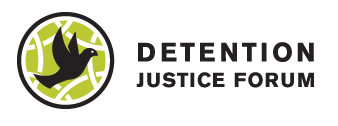Sonke is co-founder and co-coordinator of the Detention Justice Forum, a civil society coalition that promotes and protects the rights and well-being of detainees in South Africa. This press statement is released after the Forum’s annual general meeting, and highlights key concerns around impunity for torture and assault of inmates, dysfunction in healthcare services in prisons, severe short staffing in prisons, and overcrowding in Pollsmoor Remand Detention Facility.
Human rights groups and organisations affirmed their commitment to advocating for human rights and constitutional compliance within the criminal justice sector in South Africa.
The Detention Justice Forum (DJF) comprises of civil society organisations concerned with the rights of detainees. It was established in March 2012 with the aim of ensuring that the rights and well-being of those who are detained are protected, promoted, and fulfilled.
On 12 and 13 February, member organisations attended the Forum’s Annual General Meeting (AGM) in Braamfontein. The Wits Justice Project, Just Detention International-South Africa, and Sonke Gender Justice were unanimously elected to serve on the coordinating committee of the DJF.
Various human rights issues were discussed during the two-day meeting. The DJF noted with grave concern a number of instances where the health of both inmates and warders was being endangered in correctional centres. This includes cases of ARV and TB medication not being made available to detainees, as well as of inmates with chronic and emergency medical needs being neglected by both public hospitals and the Department of Correctional Services (DCS).
Of particular concern to the Forum was the issue of the working conditions of warders. Correctional Services officials face challenges such as shocking inmate-to-warder ratios — where four or five officers are often required to oversee up to 1400 inmates; feel inadequately trained for the complexity and high demands of their jobs, and unsupported by their leadership. In addition, the DJF received a briefing on the severe overcrowding in Pollsmoor Correctional Centre and expressed strong concerns about the complaints received by Independent Correctional Centre Visitors (ICCV) regarding the 200 inmates who had to sleep on the floor in Pollsmoor for months. Despite various attempts by the ICCVs and civil society organisations to escalate the problem to the appropriate Department of Correctional Services (DCS) authorities, no action had been taken. Pollsmoor is currently at 300% capacity and has been greater than 200% for the last decade.
DJF members also discussed the ongoing inability of the Judicial Inspectorate of Correctional Services (JICS) to provide effective and independent oversight. Research commissioned by the Forum (http://detentionjusticeforum.org.za/resources/research-reports/) and presented at the AGM shows how JICS’s administrative dependence on DCS and its limited resources requires urgent statutory reform, to ensure that it is able to carry out its vital oversight responsibilities.
In this regard, the Forum discussed the vital importance of the ratification of the Optional Protocol of the United Nations Convention Against Torture (OPCAT), seeing it as a foundation stone for effective oversight in South Africa, through the establishment of the OPCAT-required national preventative mechanism. DJF members agreed to continue to advocate for the ratification of the OPCAT by South African authorities, especially given the increase in the number of reported cases of torture and assaults of inmates.
Member organisations noted with appreciation the positive impact resulting from the prison visitors programme of the Constitutional Court, in which the Justices of that court visit correctional centres on an annual basis. The DJF noted in particular the reports of visits to Boksburg and Modderbee correctional centres by Justice Edwin Cameron, which document the positive outcomes such visits can have. Importantly, the Boksburg Siyanakekela HIV Support Group for inmates, which was disbanded by DCS after the Group complained about disruptions in the supply of antiretroviral medicines, was re-established at Justice Cameron’s urging.
Member organisations resolved to continue their rights-based work and improve the conditions of people living and working within correctional facilities.
[Note to Editors]
The Detention Justice Forum (DJF) consists of civil society organisations concerned with detainees’ rights. It was established in March 2012 with the explicit aim to ensure that the rights and well-being of those who are detained are respected and upheld, as enshrined under the South African Constitution, laws, and international human rights norms and standards.
For further information please contact:
- Emily Keehn, Sonke Gender Justice – emily@genderjustice.org.za
- Sasha Gear, Just Detention International, South Africa – sgear@justdetention.org
- Nooshin Erfani-Ghadimi, Wits Justice Project – nooshin.erfani-ghadimi@wits.ac.za
To download, click here


